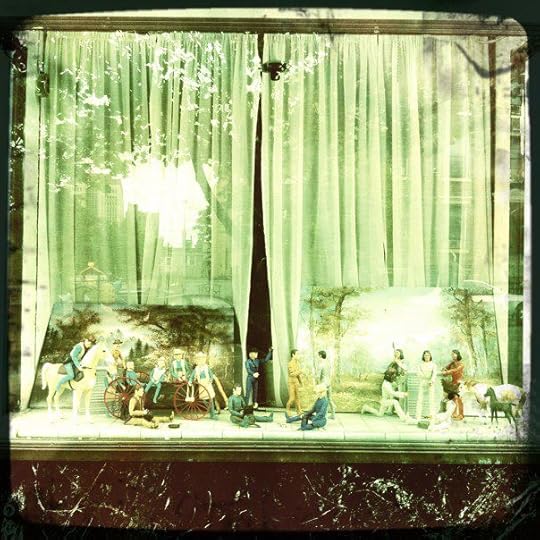We Yearn for Silence because all the Talk We Hear is Yelling
 Geof Huth, "The Dim and Wild West" (Albany, NY, 14 August 2011)
Geof Huth, "The Dim and Wild West" (Albany, NY, 14 August 2011)I likely do not believe in wholeness, depending instead on fragments that I might arrange in some manner to suggest constellation if not a completeness.
So it is that I have read the tiny observations of Olivia Dresher (a writer and publisher of literary fragments) for many years now, on Twitter. Hers are quiet contemplations of a person involved in the process of thinking and feeling in an active way. She also demonstrates, by her presence among the political maelstrom and the personal invective that often infest Twitter, how wholenesses do not cohere even in the unrarified worlds of social media in the ways we imagine these down to be. Twitter is filled with quiet thinkers. It is merely that not everyone notices them.
Olivia I have followed for years, because her puddles of words are quiet, revelatory, emotive, sometimes even painful, open, and given over to smallnesses.
And I like the small. I like something tiny enough that we might peer into into deeply enough to figure out actually what it is. To feel, fully, what it actually intends to be.
Certainly, my work has a wide range, even one poem in a form I call a yearpoem, that extended for 365 days and 15,000 pages. But what I am most known for--if, indeed, I'm recognized for anything except my constant joking and my overflowing prose--are the tiny poems I write, which usually extend across the span of but a single word but which can expand into nine or more words.
Even as a college student (a form of human nearly ready to burst from its chrysalis), I was attracted to the aphorism and read all of those of La Rochefoucauld, along with the entire Devil's Dictionary of Ambrose Bierce, rather than bother myself with the novels I was assigned to read, let alone the execrable poetry of Pope's, which I hated so much I nearly did not graduate on its account.
All I needed was the simple sentence, unadorned by brethren, designed to give us insight, even if I rejected its entreaties--for this was before I went below the level of the sentence for my literary entertainment.
Because of my inclinations, I found myself on the doorsteps of Twitter doorsteps at least ten years ago, and there I discovered Olivia Dresher, through the magic of people connected to people they know and then to those they do not.
I found Olivia was writing observations on life and her life, sometimes in full sentences, sometimes not, sometimes aphoristic and at other times diaristic. And she presented a world and a way of thinking observantly about our place within it. By this time, I was deeply in my longest project (begun in 2004), one that will die only with my death, One Million Footnotes, which was a series isolated sentences, though rarely aphoristic and usually nothing more than present mundane observations (at a microscopic level) about the life I was living.
I saw a connection between her work on Twitter and mine on a blog. But there was something else about these. Her words were more real than mine, likely more careful, too. Hers were aphoristic and philosophical poems squeezed into the space of 144 characters, but often much shorter. Also, hers were autobiographical in a palpable way, and autobiographical in the sense of encompassing both the mind and the spirit.
She was (and still is) working through the process of living in these poems. And I love autobiographical work, because to do that honestly is to make oneself vulnerable and to allow others to see how another human works and to make comparisons. We can learn through open communication from another about their life. We can heal, even in those cases where the writer cannot. (I'm thinking here of the diaries of Spalding Gray, which ends with a sprawling miasma of fragmentation and decay just before he drowns himself in the body of water to my left and across the street from where I am writing this right now.)
All of this is to say that I have finished reading Olivia Dresher's A Silence of Words today, which is an edited and revised collection of those tweets she wrote quite a few years ago now. I did not recognize any of these small aphorisms, poems, and observations, but I recognized the voice and the life she was experiencing at the time. Her words are often about loss, the most human of events, but to me they are all about the power of the fragment, the fragment of a thought, the tiny grain of knowledge that allows us to see an entire universe all at once.
But I'll give you only one of these, because it's late at night, and I have more writing to do, and because I do not want you to miss the feeling of reading through more of these in her book, A Silence of Words, or on her Twitter feed (@OliviaDresher). So here she is:
All day, night waits.
ecr. l'inf.
Published on August 16, 2020 19:22
No comments have been added yet.



